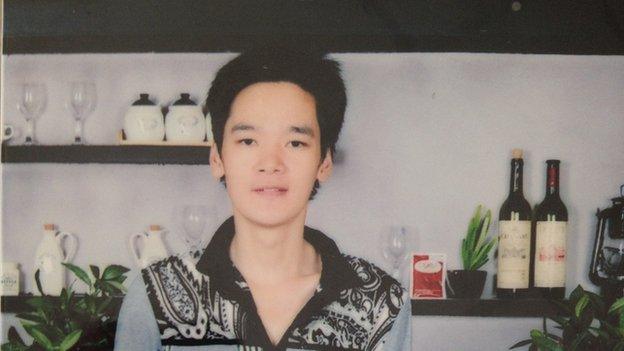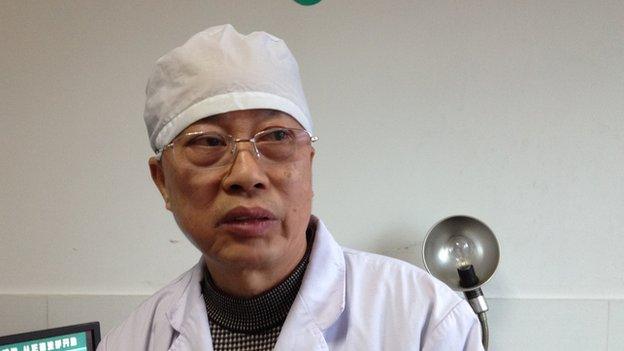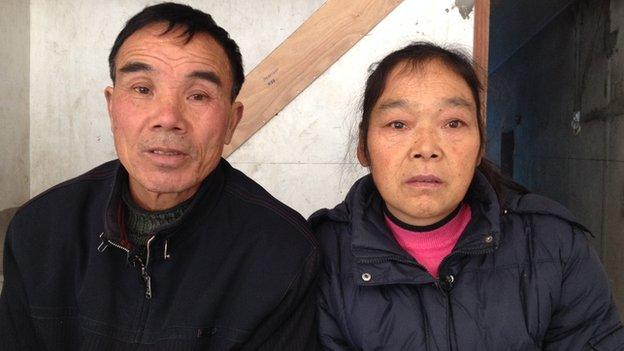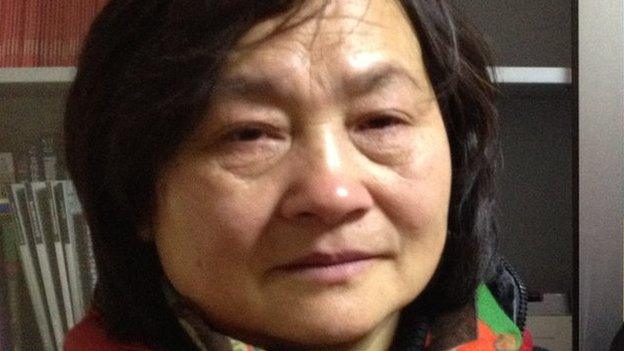China sees wave of violence against hospital staff
- Published
Hospitals in China are suffering an average of one violent attack every two weeks, according to state media
A nurse left paralysed in Nanjing, a doctor with his throat slashed in Hebei and another beaten to death with a pipe in Heilongjiang.
Three separate incidents all of which took place in China over the past two weeks. They are, of course, savage and shocking in their own right.
Even more troubling though is the fact that they are not isolated cases but the latest in a growing crisis of violence at the heart of China's healthcare system. It is leaving a trail of bereavement in its wake.
Wang Huijiao, with burning incense sticks in hand, bows deeply in front of a portrait of her dead brother. His framed photograph sits on a chair in front of which a table holds bowls of fruit and sweets. Under the chair is a pair of neatly arranged slippers.
It is now four months since Dr Wang Yunjie was murdered, but the family cannot yet bear to dismantle the memorial room they have set up in the basement.
"Our father's been unable to sleep," Ms Wang tells me. "My brother's daughter can't focus on her studies. His wife has been left all alone."
"He was funny and kind, and good to everybody. He treated his patients like his own family," she adds.

Lian Enqing, 33, claims he was in constant pain after he underwent nasal surgery
'Bad' doctors
Dr Wang was murdered on 25 October last year while on duty at the No 1 People's Hospital in the city of Wenling, in eastern China.
His killer, 33-year-old Lian Enqing, walked into his office and attacked him with a hammer and a knife.
A photograph of Lian taken in 2012 shows him looking youthful and happy shortly after he underwent nasal surgery at Wenling hospital.
But he claims it left him in constant pain and over the course of the following year, his life descended into one of deep unhappiness.
At his home on the outskirts of Wenling, his mother empties out a large bag of household items destroyed by her son during his violent rages.
"He's a good boy," she says, "it's the doctors who are bad."

Dr Wang Wiejie said he saw his colleague, Dr Wang Yunjie, get stabbed multiple times
His bedroom, left as it was on the day of the murder, offers an extraordinary insight in the mind of man tormented by his illness and furious at the Chinese healthcare system.
The medical paraphernalia is still on his desk, the bottles and pills, as are the papers documenting the two months of treatment he received at Shanghai Mental Health Centre.
They describe him as paranoid and delusional and they record his discharge date as 15 October, just 10 days before the murder.
On his bedroom wall you can still make out the Chinese characters that someone has since tried to erase, spelling out the word "death" next to the names of two doctors.
One of them is Dr Wang.
Lian's family offer the poor standard of care he received as an explanation for his actions, but not they say as a justification.
Some members of the Chinese public though are prepared to go that far.
Following the murder of a doctor in north-east China in 2012, a People's Daily online survey, now deleted from its website, asked respondents to express their feelings.
More than 60% expressed happiness by clicking on a smiley face, while just 6.7% clicked on the sad face.

Lian Enqing's family believe that he was mentally ill when he attacked the doctors
'I saw the murderer'
In Wenling hospital, the receptionist on the ward where Dr Wang was murdered said that patients threatening violence was a common occurrence.
Chinese policymakers are trying to reform the system by widening access and expanding social insurance cover.
But it is not happening fast enough, and patient dissatisfaction is running high over expensive fees and claims of malpractice and corruption.
I find Dr Wang Wiejie, a former colleague of Dr Wang Yunjie, at his desk treating patients. He was there the day of the murder and he tried to intervene.
"I saw the murderer stab Dr Wang two or three times," he said. "I realised that if he stabbed him one more time then it would surely kill him."

Dr Wang's sister, Wang Huijiao, says China's medical system is broken
"So I pulled his hand away and saw the knife, about 35cm (14in) long, and he then stabbed me in the chest. Then he stabbed Dr Wang again and he fell to the ground."
There is now a new police post at the hospital gate, but public hospitals are by their nature public, and there seems to be little the authorities can do.
The families of both Dr Wang and Lian Enqing feel a sense of deep injustice.
Lian's family believe, as proven by his medical papers but contrary to the court's findings, that he was mentally ill at the time of the attack. They are appealing against his death sentence.
Dr Wang's family are angry at how the murder has been portrayed in court and in the Chinese press. This was not, they believe, a simple dispute between doctor and patient.
Dr Wang was not even Lian's surgeon, they say, but simply involved in trying to mediate his complaint.
They say the hospital placed a limit on the number of his colleagues attending his funeral after staff held a large demonstration in the hospital grounds demanding better protection.
"The hospital told us that every day there are people who come and threaten staff with knives," said Dr Wang's sister, Wang Huijiao.
"My brother died for the medical system. He died because the system is broken."
Hear more about this story on Health Check, Wednesday 5 March, BBC World Service, 20:32 GMT.
- Published1 January 2014
- Published14 January 2014
- Published29 November 2011
- Published18 July 2011